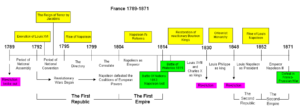From 1829 onwards, during this time of Eugene’s personal suffering, grief and illness, there was another aspect of stress and worry: the changing political climate of France which was turning against religion. His life would be significantly affected by this, and thus it is important to spend some time understanding the situation, and Eugene’s reaction to it. In order to do this, we need to look back on the life of Eugene as it was affected by the changing historical and political situation in France.
Born in 1782, Eugene was part of the nobility, with all the privileges associated with that class. His father, a highly-educated lawyer, was one of the leading citizens of the city. Yvon Beaudoin writes:
Charles Antoine de Mazenod, Lord of Saint Laurent and father of Eugene, was born at Aix on January 24, 1745. He earned a license in law on June 16, 1764. As an advocate to the parliament, in 1771, he was received as president of the Parliament with right to wear the round black velvet cap. February 3, 1778, he married Marie Rose Eugénie Joannis with whom he had three children: Charlotte Élisabeth Eugénie (1779-1784), Charles Joseph Eugène (1782-1861) and Charlotte Eugénie Antoinette (1785-1867).
“Charles Antoine…, being a humanist and an accomplished jurist, possessed a wealth of knowledge acquired from the study of the finest works of literature. He was the author of a complete set of works on the history of the States and Tribunals of Provence…” (LEFLON, Jean, Eugene de Mazenod, vol I, trans. Francis D. Flanagan, o.m.i., p. 32)
Charles Antoine emigrated to Italy in December of 1790 and did not return to France until the end of December 1817.
(http://www.omiworld.org/en/dictionary/historical-dictionary_vol-1_m/835/mazenod-family-de/)
Rene Motte gives us the background:
Their house was on the main street, the Cours, and “it was in this house that Eugene’s father and his two uncles were born. And, in the following generation, Eugene and his two sisters, the eldest Charlotte Élisabeth Eugénie, who died at five years of age and the youngest, Charlotte Eugénie Antoinette. To care for this little group of people, there were twelve servants. Their way of life was that of the rich nobility prior to the Revolution, but from his very infancy, Eugene was subjected to the threat of the Revolution. For example, on December 14, 1790, he could see across from his house the bodies of two of his father’s friends, executed by the revolutionaries and hung from the street lamps.”
( http://www.omiworld.org/en/dictionary/historical-dictionary_vol-1_a/529/aix-mazenod-mansion/ )


I think that I might have become almost complacent of Eugene’s youth – somehow I managed to ignore or forget about those early years of what I will call incredible wealth (at least from the appearances) and then drastic poverty and the effect of the having to flee the revolution.
I think of my own beginnings and the effects of extreme violence and loss of personhood and the wounds that scarred my being from such a way of living. For young Eugene how bewildering and painful it must have been for him as the circumstances of his life kept rapidly changing and seeming to go from bad to worse.
I look at the peoples who are fleeing their homes today and it is almost too much for my mind to comprehend. I look at how they have suffered – incredible suffering and depravation – Eugene fleeing and moving from one town/city to another and young families fleeing from a town or city and being forced to cross an ocean or live in a what we now call a refugee camp. Sad to say but I have managed to ignore much of what Eugene went through – that does not look very pretty but there it is. I did not really allow myself to feel what it must have been like for him.
I look at the diagram and am a little stunned. Like so many of the refugees – the children and young people – all they know of their country is that there has been war and cruelty and death from before they were born. I think of some of the small countries in Africa and all they have known is political upheaval and war. It is hard for me to even imagine and I wonder why I have been holding my heart back from feeling and loving even if it was someone who died 150 or so years ago. The blocks of Eugene’s life are slowly beginning to fall into place and I see and understand him in a new light.
There is a new awareness of him right now, and perhaps an even deeper understanding and love for him. I am not comfortable with all of this for what do I do with it. I suspect I need to sit with it and hold it.